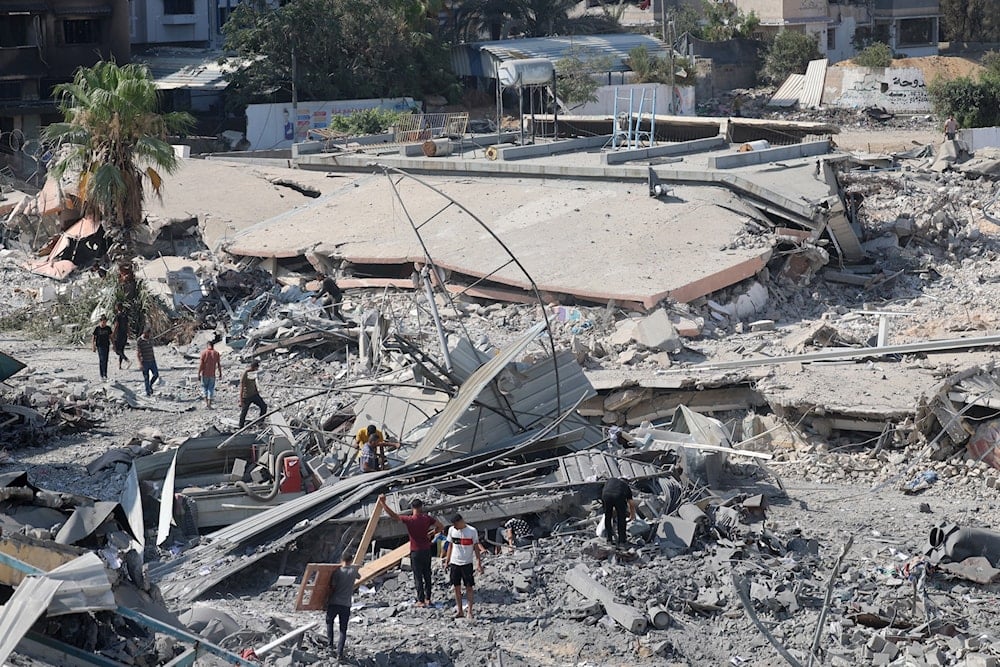Hamas: We've shown flexibility in talks, Netanyahu obstructing deal
Hamas says Netanyahu's attempts to add new demands, which were not included in any of the previous proposals, confirm he is looking for ways to obstruct the agreement.
-

People walk on rubble as they inspect the damage at the UN Relief and Works Agency for Palestine Refugees (UNRWA) building complex in western Gaza City's Al-Sinaa neighborhood on July 12, 2024. (AFP)
Hamas is suggesting during ceasefire negotiations that an independent government of non-partisan figures run post-war Gaza and the Israeli-occupied West Bank, said Hossam Badran, a member of the movement's political bureau, on Friday.
"We proposed that a non-partisan national competency government manage Gaza and the West Bank after the war," Badran said in a statement about the ongoing negotiations for a ceasefire and a prisoner exchange deal between the Israeli occupation and Hamas, mediated by Qatar, Egypt, and the United States.
The Hamas official stressed that "the administration of Gaza after the war is a Palestinian internal matter without any external interference, and we will not discuss the day after the war in Gaza with any external parties."
Another Hamas official told AFP that the proposal for a non-partisan government was made "with the mediators."
The official explained that the government will "manage the affairs of the Gaza Strip and the West Bank in the initial phase after the war, paving the way for general elections."
Badran also called on the international community to put pressure on the side obstructing the negotiations and force it to stop the aggression against Gaza, emphasizing that the steadfastness and resilience of the Palestinian people and the heroic performance of the Resistance "are what compel the occupation government to comply with our people's conditions and rights."
This comes after Israeli occupation Prime Minister Benjamin Netanyahu insisted that "Israel" maintain control of the Philadelphi corridor and the Rafah crossing, key Gaza territories along the border with Egypt, which conflicts with Hamas' position that the occupation forces must withdraw from all of the Gaza Strip after a ceasefire.
Netanyahu claimed on Thursday that control of the Philadelphi corridor is part of efforts to prevent "weapons to be smuggled to Hamas from Egypt."
Izzat al-Rishq, a member of the political bureau of Hamas, said that Netanyahu's frantic attempts to add new demands, which were not included in any of the previous proposals discussed with the mediators, confirm that he is still stalling, procrastinating, and looking for ways to obstruct the agreement.
Read more: 'Israel' not giving clear answers regarding Hamas demands: Exclusive
Israeli-Palestinian mediated talks led to no results: PIJ Deputy-Chief
On Thursday, Mohammad al-Hindi, the deputy secretary general of the Palestinian Islamic Jihad (PIJ), told Al Mayadeen that the latest round of mediated negotiations between the Palestinian Resistance and the Israeli occupation did not lead to any results.
Al-Hindi explained that Netanyahu and his government's priority is unrelated to retrieving Israeli captives in the Gaza Strip, but instead, it is to carry on the war on the besieged territory.
He said that the Palestinian Resistance demanded guarantees from mediators that the temporary ceasefire for completing the prisoner exchange process would lead to a permanent ceasefire.
The PIJ official said that Netanyahu is taking advantage of the current turbulent political scene in the United States, underscoring that the closer the US presidential election gets, the less pressure his government could be put under to finalize a deal with the Palestinian Resistance.
As for Washington's role in negotiations, al-Hindi said the US has shown that it "does not want to hold Netanyahu responsible" for the failed talks.
In his interview for Al Mayadeen, the Palestinian official reiterated the Resistance's negotiating team's positive and flexible performance during the talks.
Read more: Netanyahu wants 'war of everyone against everyone': Former Israeli PM

 4 Min Read
4 Min Read








